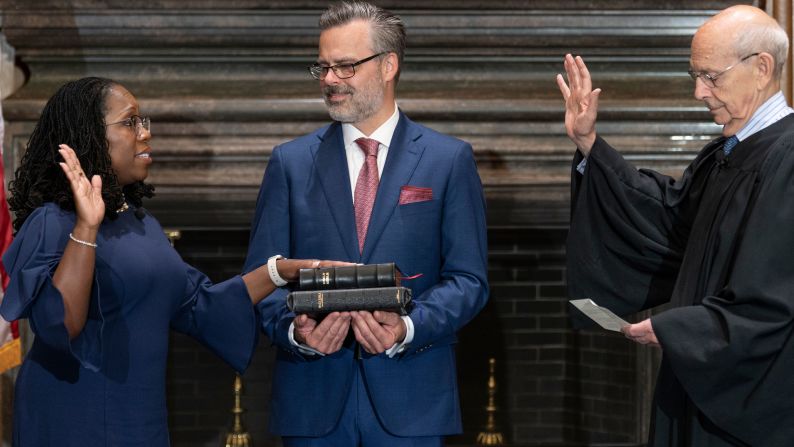Supreme Court Justice Stephen Breyer plans to retire, setting up a seismic confirmation battle at the start of a midterm election year as President Joe Biden tries to find his footing with his agenda stalled and Democrats divided in Congress.
Breyer, 83, is expected to stay on until the end of the court term and until a replacement is confirmed, a well-placed source familiar with the matter told CNN.
He informed Biden of his plans last week and will formally announce his retirement at a White House event with the President as early as Thursday, two sources told CNN.
Although Biden’s pick will not change the balance of the court, given that Breyer will almost certainly be replaced with a fellow liberal, the new nominee is expected to be much younger and could serve on the court for decades. The court currently has six conservative justices appointed by Republican presidents, and three liberals appointed by Democrats.
On the campaign trail, Biden vowed that if he were to get a vacancy he would fill it with an African American woman, which would represent a historic first for the high court. White House press secretary Jen Psaki told reporters Wednesday that Biden “certainly stands by” the promise, but declined to offer any specifics.
Potential candidates include Judge Ketanji Brown Jackson, 51, who was confirmed last year to the powerful DC-based appellate court. She once served as a law clerk for Breyer, and also worked as an assistant federal public defender and served on the US Sentencing Commission.
RELATED: How the Supreme Court confirmation process works
Another possibility would be Justice Leondra Kruger, 45, who serves on the California Supreme Court and is a veteran of the US Solicitor General’s office. Members of Biden’s team have previously stressed that they are seeking diversity for judicial appointments and that they are prepared to break from the norm and consider those whose legal experiences have been historically underrepresented on the federal bench, including those who are public defenders and civil rights and legal aid attorneys.
The timing of Breyer’s decision to retire comes as he has faced an intense pressure campaign from the left, which urged him to leave the court while Biden has a clear path to replace him.
Democrats have been burned repeatedly by timing, Republican gridlock and the refusal of another justice to retire when the political circumstances were ripe.
Notably, Justice Ruth Bader Ginsburg did not heed calls that she retire at the beginning of former President Barack Obama’s second term, when Democrats still controlled the Senate. Her death weeks before the 2020 election allowed then-President Donald Trump to make the pivotal appointment of Justice Amy Coney Barrett to the bench, which moved the court further to the right.
Meanwhile, the confirmation fight to fill the vacancy left open by Justice Antonin Scalia’s unexpected February 2016 death showed Republicans’ willingness to block appointments by Democratic presidents. The Senate, then controlled by the GOP, refused to consider Obama’s nominee for the seat, Merrick Garland, and Trump then filled it with Justice Neil Gorsuch, with Senate Republicans lowering the threshold vote from a 60-vote requirement to a bare majority to do so. The maneuver deprived Democrats of what was likely a once-in-a-generation opportunity to flip the court’s balance.
Senate Majority Leader Chuck Schumer said Biden’s nominee “will receive a prompt hearing in the Senate Judiciary Committee, and will be considered and confirmed by the full United States Senate with all deliberate speed.”
In the current 50-50 Senate, all Democrats would need to stay united with Vice President Kamala Harris breaking a potential tie in the event no Republicans break ranks. But Senate Democrats are confident that Biden’s nominee, whomever he selects to replace Breyer, will receive enough votes to for confirmation, according to senior Democratic sources.
Asked if Republicans intend to block the President’s nominee, Senate GOP Leader Mitch McConnell told reporters Wednesday, “We don’t even know who the nominee is yet,” adding that he’ll have more to say on Breyer’s “long and distinguished career” after his official retirement announcement.
South Carolina Republican Sen. Lindsey Graham, who voted for Obama’s first two nominees, said the GOP won’t be able to block Biden’s choice.
“If all Democrats hang together – which I expect they will – they have the power to replace Justice Breyer in 2022 without one Republican vote in support,” Graham said in a statement. “Elections have consequences, and that is most evident when it comes to fulfilling vacancies on the Supreme Court.”
Biden on Wednesday afternoon declined to weigh in on the retirement news.
“Every justice has the right to decide what he or she is going to do, and announce that on their own,” Biden told reporters in the State Dining Room. “There’s been no announcement from Justice Breyer – let him make whatever statement he is going to make, and I’ll be happy to talk about it later.”
Breyer, a consistent liberal vote on the Supreme Court with an unflappable belief in the US system of government and a pragmatic view of the law, has served nearly three decades on the bench.
Appointed in 1994 by then-President Bill Clinton, Breyer has sought to focus the law on how it could work for the average citizen. He was no firebrand and was quick to say that the Supreme Court couldn’t solve all of society’s problems. He often stressed that the court shouldn’t be seen as part of the political branches but recognized that certain opinions could be unpopular.
“It is wrong to think of the court as another political institution,” Breyer told an audience at Harvard Law School in 2021. “It is doubly wrong to think of its members as junior league politicians.”
“If the public sees judges as ‘politicians in robes,’” he warned, “its confidence in the courts, and in the rule of law itself, can only diminish, diminishing the court’s power, including its power to act as a ‘check’ on the other branches.”
The news comes as the court’s conservative majority has flexed its muscles in a blockbuster term. The justices have already heard one case that could overturn Roe v. Wade and another that could expand gun rights. Recently, Breyer joined his liberal colleagues, Justice Sonia Sotomayor and Elena Kagan, in a bitter dissent when the conservative majority blocked Biden’s vaccine mandate for large employers. Breyer also dissented last year when the court allowed a Texas six-week abortion ban to remain in effect. The law is the strictest in the nation and bars abortion before most women even know they are pregnant.
In pictures: Former Supreme Court Justice Stephen Breyer
Breyer’s years on the court
At oral arguments and in conference, Breyer has seen himself as a problem solver. He brought with him the experience of working in Congress as the chief counsel of the Senate Judiciary Committee in the late 1970s and an understanding of what went into many of the statutes that eventually made their way to the court. He sought consensus when possible but remained true to his liberal roots in areas such as the death penalty, affirmative action, abortion, gun rights and campaign finance.
In his later years on the court, he was best known for a dissent he wrote in 2015 in a case concerning execution by lethal injection. He took the opportunity to write separately and suggest to the court that it take up the constitutionality of the death penalty. In the opinion, Breyer wrote that after spending many years on the court reviewing countless death penalty cases, he had come to question whether innocent people had been executed. He also feared that the penalty was being applied arbitrarily across the country. He noted that in some cases death row inmates could spend years – sometimes in solitary confinement – waiting for their executions.
“And so I put together this evidence to say this is not what people expected when they wrote the cases upholding the death penalty more than 40 years ago,” Breyer told CNN’s Wolf Blitzer in 2015.
“And therefore I think it’s time to revisit the issue,” he said, though that chance never came.
Indeed, in 2019, after the appointments of Justices Neil Gorsuch and Brett Kavanaugh had turned the court to the right, Breyer stayed up most of the night once to write a dissent when the court denied a stay of execution for an Alabama inmate challenging the state’s three-drug protocol. In the dissent, he noted that the conservative majority could have chosen to discuss the case later in the day at a regularly scheduled closed-door conference, but they had refused to do so.
“Should anyone doubt that death sentences in the United States can be carried out in an arbitrary way, let that person review the following circumstances as they have been presented to our court this evening,” Breyer wrote in an opinion released at 3 a.m. ET. He said that “what is at stake” is the “right of a condemned inmate not to be subjected to cruel and unusual punishment in violation of the Eighth Amendment.”
In early 2021, after Justice Amy Coney Barrett had joined the court, he blistered the Trump administration for racing to reinstate the federal death penalty after a nearly two-decade pause. “How just is a legal system that would execute an individual without consideration of a novel or significant legal question that he has raised?” Breyer queried in another late-night opinion.
As the new conservative majority solidified during the Trump administration, Breyer signaled it was moving too aggressively to overturn precedent. The case at hand was not about abortion, but he made clear he was worried about the stability of the law and the future of long-standing rulings such as Roe v. Wade.
“Today’s decision can only cause one to wonder which cases the court will overrule next,” Breyer wrote at the time.
Breyer – always rooted in an optimistic view of the world – defended the institution of the court in 2021 as liberals sought to add members in order to dilute the conservative majority and as Biden commissioned a 36-member presidential commission to discuss reform proposals. He expressed concern about any so-called “court packing” proposals that would change the structure of the court.
“It’s an institution that’s fallible, though over time it has served this country pretty well,” he told CNN’s Joan Biskupic in an interview last October. “As mother used to say: every race, every religion, every point of view possible is held by people in this country. And it’s helped them to live together.”
Path to the bench
Born in San Francisco, Stephen Breyer is the son of Irving, who worked as a legal counsel for the San Francisco Board of Education, and Anne, who volunteered for the League of Women Voters. He attended Harvard Law, later teaching there, and he worked for Sen. Ted Kennedy, a Massachusetts Democrat who would become a mentor.
In 1980, then-President Jimmy Carter appointed Breyer to the 1st US Circuit Court of Appeals. Clinton eventually tapped him to replace Justice Harry Blackmun, and the Senate approved the nomination by 87-9. Breyer was sworn in as a justice in August 1994.
Clinton said Breyer had “proven that he can build an effective consensus and get people of diverse views to work together for justice’s sake.”
“He has a clear grasp of the law, a boundless respect for the constitutional and legal rights of the American people, a searching and restless intellect, and a remarkable ability to explain complex subjects in understandable terms,” Clinton said.
This last court term, Breyer was chosen by Chief Justice John Roberts to write a 7-2 opinion allowing the Affordable Care Act to remain in place, and he also wrote the opinion on an important school speech case that divided the court 8-1. It was Breyer, though, who joined with his liberal colleagues penning the 6-3 dissent when the court delivered another blow to public-sector unions – breaking along ideological lines.
In 2016, then-Justice Anthony Kennedy chose Breyer to pen a decision that struck down a restrictive abortion access law in Texas that critics said would have shuttered all but a handful of clinics in the state.
Kennedy trusted that Breyer would write a straightforward opinion that Kennedy, the swing vote, could join.
Although Breyer is known for his bridge-building skills, there were times when he can speak forcefully.
He wrote a scathing dissent in 2007 when the court struck down efforts in two publigrc school systems to take race into account when making school placement assignments.
He read parts of his dissent – twice as long as any he’d ever written – from the bench. He said he was worried that the majority of the court was jeopardizing Brown v. Board of Education, the landmark opinion declaring school segregation unconstitutional.
“The last half century has witnessed great strides toward racial equality, but we have not yet realized the promise of Brown,” Breyer wrote. “To invalidate the plans under review is to threaten the promise of Brown.”
An eye toward collegiality
Breyer is a prolific writer off the bench. One book, called “Active Liberty: Interpreting Our Democratic Constitution,” was written in response to Justice Antonin Scalia’s judicial philosophy called “originalism,” which stressed that the Constitution should be interpreted based on its original public meaning. The two justices appeared together on occasion to discuss their opposing views, to the delight of law school audiences.
Breyer was also on the losing side of Bush v. Gore, the 2000 decision that decided the presidential election for George W. Bush. Always an optimist, Breyer pointed out that while he thought the case had been wrongly decided, the ruling was accepted by the public and it caused no one to demonstrate in the streets.
Breyer cares deeply about the court’s public perception and lamented privately that the nomination process had become such a spectacle.
In public, however, he largely avoids delving into the subject. “You have to remember that I was not a nominating or confirming person,” he would tell audiences. He’d point out that asking his opinion about who should be nominated to the bench or how they should be confirmed was like “asking for the recipe for chicken a la king from the point of view of the chicken.”
Ever the charming, absent-minded professor, he can unleash long legal hypothetical questions from the bench that could confuse even the most experienced advocate.
He taught himself French by reading Marcel Proust, and he delights in his three children; his wife, Joanna Hare; and their grandchildren.
Above all, Breyer has cared about collegiality.
“There’s no reason we can’t be friends,” he said of his colleagues during the 2015 CNN interview. “There’s no reason that human beings cannot differ civilly on matters of great importance.”
This story has been updated with additional reporting Wednesday.
CNN’s Tierney Sneed, Ali Zaslav and Paul LeBlanc contributed to this report.


































































